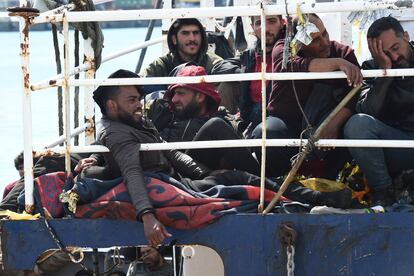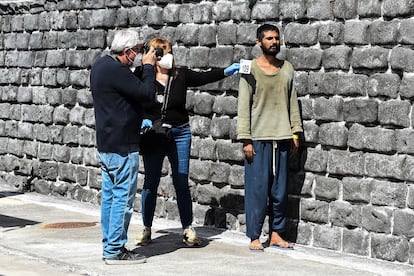Is Italy really in a migration emergency? Increase in arrivals and lack of resources strain the situation
The country, whose government has declared a state of emergency to tackle the influx, has become the main illegal gateway into Europe in the first quarter of 2023

Italy has served as the main gateway for migrants arriving in Europe illegally in the last three months. According to Frontex, the European border agency, over half of all arrivals at EU borders (27,651 in the first quarter of 2023) have come by sea via the central Mediterranean route. Although Italy is no stranger to this situation, numbers have risen in recent times, and over the last decade it has provided the source of the country’s main electoral discourse, particularly on the right of the political spectrum. For this reason, and faced with the recent surge in arrivals (the figures have quadrupled in comparison to the previous year), Giorgia Meloni’s far-right government decreed a state of emergency on Tuesday in order to address the situation. This is an unusual measure — it had only previously been enforced for this purpose in 2011, during Silvio Berlusconi’s last term in office — and comes in a response to several issues: the sharp upturn in arrivals, the limited capacity of a collapsed reception system, and a stark warning to the European Union on the need to collectively confront this challenge.

It is still not clear how far-reaching the declaration, which stems from the collapse of reception centers like the one in Lampedusa, will be. It is understood that a commissioner will be appointed and that the decree will be supported by an initial budget of €5 million, which could rise to up to €300 million. However, in light of the current situation, nobody has yet ventured to express any concrete criticism of the measure. It is possible, though, to analyze the current situation in numbers up to April 11. Arrivals by sea during that period (31,292) have almost quadrupled in relation to 2022 (7,928) and 2021 (8,505). Additionally, an unprecedented peak (13,216) was witnessed in March, which has led to fears of a record number of arrivals by the end of the year that could exceed the 2016 total of 181,000. The number of deaths on the Mediterranean route reached another all-time high in the first quarter of 2023, with 441 people losing their lives at sea. Do the numbers alone provide sufficient justification for the state of emergency?
Matteo Villa, a senior researcher at the Institute for International Political Studies (ISPI) and co-director of its data lab, believes that the situation presents “some unique factors”. “I am not going to judge whether the declaration of a state of emergency is justified. It is a political decision. But there is no denying that the level of arrivals in the first three months of the year is the highest in history. Even considering 2017, which saw an all-time record in that same space of time. If the trend carries on as it has over these past three months, the number of arrivals could reach up to 180,000, although our forecasts indicate it will be around 130,000,″ he says.
Another key issue must also be taken into account. At present, some 120,000 places in the reception system are occupied (the system operates on an accordion-type model, whereby places are allocated on a needs basis). Should the number of arrivals surpass 150,000, it would be extremely difficult to provide more, according to experts. Therefore, the main problem now concerns the handling of arrivals through the national reception system, which reached its maximum capacity of 190,674 in October 2017, but was ultimately scrapped during Matteo Salvini’s tenure as interior minister (2018-2019). Subsequently, the nature of the centers changed. The tenders decreased their bidding amounts, and as a result, many are not awarded. Would the state of emergency resolve this? In part, it would theoretically speed up these awarding processes and allocate more funds, to be coordinated by a commissioner. Nevertheless, the measure has raised doubts.
In 2018, Salvini scaled back humanitarian protection and renamed it as ‘special protection’. As a consequence, the percentage of migrants benefiting from it dropped from 40% to around 20%. Later, the percentage of protection increased again slightly under his successor, Luciana Lamorgese. “But if we had stuck to Salvini’s rate, today there would be at least 32,000 more illegal immigrants [there is an estimated total of about 500,000 in Italy]. It is a mistake to address the emergency with measures that would further increase illegal immigration. It only adds to the problem, because you are pushing many people to work in the black economy or toward delinquency,” says Villa.

NGOs operating in Italy, which have been hounded by Meloni’s government in their maritime rescue work, agree that the situation may become critical in the medium term. Marco Bertotto, program director of Doctors Without Borders in Italy, also attributes this to the weakening of the reception system. “Since 2018, investment has stopped and the emergency situation has continued. This does not help when you are faced with numbers like these. The country is clearly heading toward a crisis. And if this is already the case in April, given the situation in Tunisia, the new Turkish route that reaches Calabria, the situation in Libya and the cumbersome management of the rescue activity at sea, then it is evident that we are heading into a perfect storm.”
Nobody wants to use the word emergency, but the definitions being used are very similar. “It is a difficult situation that should not be dealt with by declaring an emergency. But it is alarming because the numbers are really high and we have a system that is not prepared to deal with it,” says Bertotto. Indeed, this is now the primary concern of the Italian government, which has even recently accused the Russian mercenary Wagner Group of facilitating Libyan departures as part of a hybrid warfare strategy against Rome’s pro-Ukrainian stance.
Sign up for our weekly newsletter to get more English-language news coverage from EL PAÍS USA Edition
Tu suscripción se está usando en otro dispositivo
¿Quieres añadir otro usuario a tu suscripción?
Si continúas leyendo en este dispositivo, no se podrá leer en el otro.
FlechaTu suscripción se está usando en otro dispositivo y solo puedes acceder a EL PAÍS desde un dispositivo a la vez.
Si quieres compartir tu cuenta, cambia tu suscripción a la modalidad Premium, así podrás añadir otro usuario. Cada uno accederá con su propia cuenta de email, lo que os permitirá personalizar vuestra experiencia en EL PAÍS.
¿Tienes una suscripción de empresa? Accede aquí para contratar más cuentas.
En el caso de no saber quién está usando tu cuenta, te recomendamos cambiar tu contraseña aquí.
Si decides continuar compartiendo tu cuenta, este mensaje se mostrará en tu dispositivo y en el de la otra persona que está usando tu cuenta de forma indefinida, afectando a tu experiencia de lectura. Puedes consultar aquí los términos y condiciones de la suscripción digital.









































